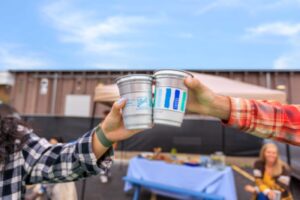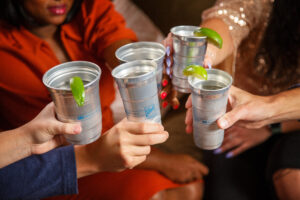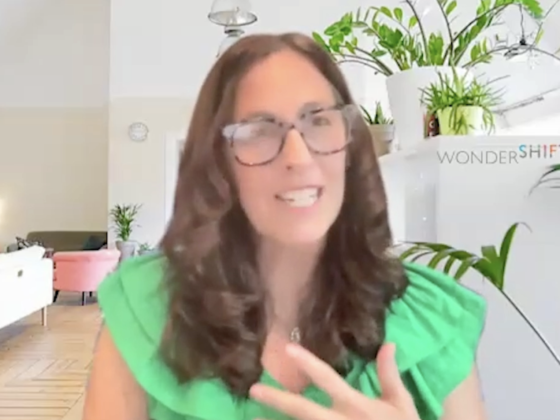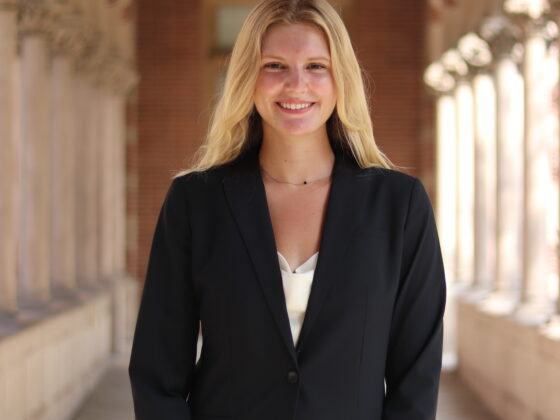In our “Stories from the Field” series, SageRiver sits down with senior leaders who are transforming their organizations for tomorrow. Our latest conversation is with Ball Corporation’s Mike Schaarschmidt, senior director of supply chain. As a leading supplier of aluminum packaging for beverage, household and personal care customers, Ball is focused on helping the world move toward a truly circular economy, where materials can be used again and again. Recently, Ball accepted a unique opportunity to further its mission by partnering with young strategists to market a more sustainable solution to plastic cups. The collaboration helped Ball double brand awareness and optimized an online sales distribution channel to drive increases of the new product sales.
 It wasn’t how Mike Schaarschmidt expected to begin his new job at Ball Corporation.
It wasn’t how Mike Schaarschmidt expected to begin his new job at Ball Corporation.
“The day I started was the day we decided we were going to pivot,” he recalls. “It was June 2020, at the height of the pandemic, right when everyone realized that social distancing would last more than a few weeks.”
As the new supply chain leader, Schaarschmidt was part of a team charged with launching a breakthrough product via retail, online and foodservice channels. Called the Ball Aluminum Cup®, the product was infinitely recyclable and promised to significantly reduce plastic use and landfill waste.
Initial market research showed that the product tended to “sell itself forward,” meaning consumers would recommend it to friends and family once they’d experienced it themselves. With those findings in mind, Ball developed a launch strategy aimed at driving consumer sales through word-of-mouth marketing and social media virality. The strategy would center on sales to large venues—such as sports stadiums and concert venues—supported by advertising and celebrity-endorsed social media content.
But COVID restrictions threw a wrench in those plans, forcing the company to focus instead on retail sales through large distributors and stores such as CVS and Target. The Ball Aluminum Cup® found early success among older, more affluent consumers and larger businesses. But, the product hadn’t gained traction among younger consumers or smaller businesses and restaurants.
Enlisting New Strategists for Fresh Insights
Just as Ball was developing the next phase of its strategy, Schaarschmidt received an unexpected call from Susan Heinzeroth, founder of SageRiver Consulting and an adjunct faculty member at the CU School of Business. Heinzeroth had been inspired by Ball’s new infinitely recyclable product and suggested that a partnership with her strategy class might benefit Ball, as well as her students.
Schaarschmidt liked the idea—and his colleagues agreed.
After briefing the students on their existing marketing strategy and results, the Ball Corporation team identified four marketing strategy goals:
1. Grow overall awareness of the new brand
2. Educate consumers about the benefits of the product (i.e., that it was more than just a disposable cup)
3. Drive trial via a more expansive push into the foodservice market (especially restaurants)
4. Reach younger generations via a push into organic and paid social media
Four teams of student strategists were formed to focus on younger consumers or small businesses. With coaching from Heinzeroth, the teams conducted interviews, focus groups and surveys to understand the perceptions, needs and values of those audiences and then presented their recommendations to Ball.
Going Viral Via Lifestyle Content
The first teams targeted consumers in their late twenties to early forties. These consumers valued sustainable products and could afford a slightly higher price point than the red plastic cups they were accustomed to purchasing. These consumers were especially active on Tik-Tok and Instagram, and they liked engaging with content from social influencers and friends who shared their values and interests. Word-of-mouth marketing was an effective strategy with this group, and they liked the way the Ball Aluminum Cup® kept drinks cold in a sturdy container.
One challenge emerged with this audience, however. Younger consumers didn’t know much about Ball or understand the tagline that was being used for the product—Infinitely Recyclable. While this disconnect made them question the truth of the message, it also opened the door to educating consumers about Ball’s longstanding commitment to sustainability and the promise of aluminum, which can literally be recycled again and again without degrading.
“Most people don’t realize it, but 75 percent of all the aluminum that has been mined globally is still in circulation,” Schaarschmidt said.
The student team recommended that Ball create behind-the-scenes videos showing how the cups are made and recycled and share that content on social media. They also encouraged Ball to shift toward more authentic and timely content by giving influencers contractable freedom to jump on trending topics around sustainable products and integrate the Ball Aluminum Cup® into other activities and content. These messages, which would leverage Ball’s Colorado roots as part of an informal, outdoors-oriented culture, would position the Ball Aluminum Cup® as a lifestyle brand that was better for the environment.
Building New Avenues for Personalized, Convenient Sales
The other student teams focused on small, independent operators, including restaurants, breweries and bars, as well as corporate, wedding and catering services. While these audiences had diverse needs, they all wanted an easier way to purchase Ball’s product in smaller quantities, since they don’t order in bulk through large distributors. The students recommended that Ball establish an online store through Amazon, offer the cups in different sizes and drive small businesses to the Amazon store through search engine optimization and sponsored ads.
Most small operators also wanted the ability to personalize the Ball Aluminum Cup® with their own business or event logos. The students recommended that Ball leverage relationships with third-party vendors to explore labeling options for small quantity purchases. This would allow Ball to service the market without investing significantly in limited-run printing.
Telling a Larger Story
Ball has already implemented several of the students’ recommendations—and seen big results. Brand awareness has doubled from 20 to 40 percent, and the Ball Aluminum Cup® can now be purchased in multiple sizes through an online Amazon site that has significantly increased sales. Thanks to rising demand, Ball is now selling its cups through 35,000 retail stores and has gained distribution in 60 percent of retail chains as well.
Just as importantly, working with the students has reinforced how the Ball Aluminum Cup® can help the company tell a larger story.
“Every aspect of Ball—from aerospace to cups to cans—is truly about sustainability and the sustainable benefits of aluminum,” Schaarschmidt said. “When the students presented their recommendations, they told us what they learned about the product and about recycling in the United States. We need to take the whole country through the same journey.”
Luckily, Ball will have help from a passionate new group of brand ambassadors.
“It was rewarding to work with a company to help solve a real problem,” said Emilie Waggoner, who participated in the project before graduating. “I still talk about this project a year later, and now, my coworkers bring me Ball Aluminum Cups® because they know I love them so much!”




